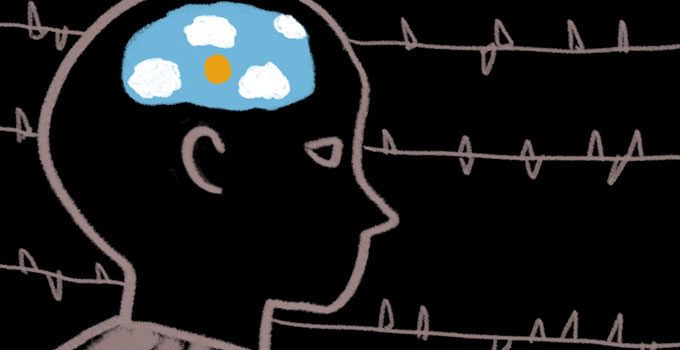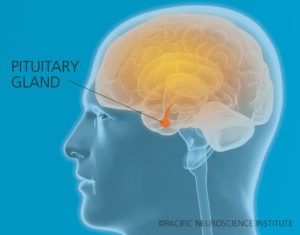

Doing Our Best With Pituitary Disorders
by Guest Author
By LINDA M. RIO, M.A., Marriage & Family Therapist
Pituitary disorders are still considered by some “rare”, although many experts consider them unfortunately rarely diagnosed. And the term rare is in reference to the many other diseases that exist in great numbers like heart disease, cancer etc.
Signs and symptoms of pituitary disorders range from the invisible and often difficult to detect hormonal imbalances to the often missed accompanying mental health symptoms which in some cases even pre-date what can be detected medically. Pituitary patients have been known to go months, to years, to decades until a proper diagnosis has been made. All of this can lead to an accumulation of frustration and desperation on the part of patients and their loved ones. Some give up, stop searching, become withdrawn, isolated, and despair. But others have found another purpose for their entrance into this elite medical minority.
Deciding how to move forward

Sharmyn McGraw, patient advocate for the Pacific Neuroscience Institute and her neurosurgeon, Daniel F. Kelly, MD, has often written and spoken about her own path with pituitary. She stated, “I still say the day I was told I had Cushing’s disease, an uncommon, life-threatening medical condition, was a very happy day and a day that I will never forget.” Sharmyn became an advocate not only for patients but for education of professionals and the public. Others have found other ways to come to terms with what a pituitary disorder has brought them.
 Viktor Frankl, a neurologist and psychiatrist, wrote of life in Nazi death camps and the lessons for spiritual survival he learned from his time there. Between 1942 and 1945 Dr. Frankl labored in four different concentration camps, including Auschwitz. His parents, brother, and pregnant wife died in the camps. According to Amazon, Frankl’s book, Man’s Search for Meaning, had sold more than 10 million copies in twenty-four languages by the time of his death in 1997. A 1991 survey for the Library of Congress asked readers to name a “book that made a difference in your life” and found Man’s Search for Meaning among the ten most influential books in America.
Viktor Frankl, a neurologist and psychiatrist, wrote of life in Nazi death camps and the lessons for spiritual survival he learned from his time there. Between 1942 and 1945 Dr. Frankl labored in four different concentration camps, including Auschwitz. His parents, brother, and pregnant wife died in the camps. According to Amazon, Frankl’s book, Man’s Search for Meaning, had sold more than 10 million copies in twenty-four languages by the time of his death in 1997. A 1991 survey for the Library of Congress asked readers to name a “book that made a difference in your life” and found Man’s Search for Meaning among the ten most influential books in America.
Toward the end of his career Viktor Frankl was a visiting professor at the university I attended for graduate studies. I recall at the time it seemed almost sacred to have someone of his caliber to be there. Also, when I was in high school I had a wonderful opportunity to travel throughout Europe, including countries ruled at the time by communist Russia. While there I visited a Jewish Holocaust cemetery and other World War II cites. As I begin to write this article it the Jewish holiday Rosh Hashanah. I am not Jewish so cannot write with any expertise about this but was lucky enough to attend a Catholic high school that required we have a year of study in world religions. I believe all these experiences helped establish in me not only a respect and curiosity about all religions and cultures but also an openness to other things.
I believe this eventually allowed me to open my mind to try to understand pituitary disorders.
Taking care
 Illness and suffering of any kind are truly personal and unique to each person. I also believe pain and suffering cry out for understanding and validation. In my psychotherapy practice I have often said that the Band-Aid company should be famous not only for the little bandages they sell but also for the emotional healing they provide. I use an example most parents and caregivers to children will understand. All young children at some time get cuts and bruises. To a young child even a tiny bit of blood often causes extreme cause for alarm along with tears and emotions not easily calmed, except by a Band-Aid. A parent can try telling the child all is fine, that they are not going to die from a tiny cut, to just calm-down etc. but nothing seems to work quite as magically as when the adult finally brings out the little box of bandages and applies it to the wound (even if it really isn’t necessary to stop bleeding). Almost instantly the child usually will stop crying and quickly be ready to resume their play. It really is amazing to observe.
Illness and suffering of any kind are truly personal and unique to each person. I also believe pain and suffering cry out for understanding and validation. In my psychotherapy practice I have often said that the Band-Aid company should be famous not only for the little bandages they sell but also for the emotional healing they provide. I use an example most parents and caregivers to children will understand. All young children at some time get cuts and bruises. To a young child even a tiny bit of blood often causes extreme cause for alarm along with tears and emotions not easily calmed, except by a Band-Aid. A parent can try telling the child all is fine, that they are not going to die from a tiny cut, to just calm-down etc. but nothing seems to work quite as magically as when the adult finally brings out the little box of bandages and applies it to the wound (even if it really isn’t necessary to stop bleeding). Almost instantly the child usually will stop crying and quickly be ready to resume their play. It really is amazing to observe.
But, what I believe is happening is not the “cure” from the bandage itself, but what it represents. Having a visible, tangible bandage is like the adult is saying, proclaiming, “I believe you…you are truly hurt…your wound is real…you have the right to feel…” The emotional “cure” lies in being believed. Validation of pain is truly powerful medicine.
 As adults we don’t lose our need for validation and still need “Band-Aids” sometimes. Of course, most of us think we are beyond such things and that we should be too tough for such nonsense. When in pain, fearful, hurt… we all revert to being children. This is one reason why pituitary disorders are extra difficult to cope with and endure. It is also one of the reasons why folks resist any form of psychotherapy thinking if a hurt isn’t visible then it mustn’t be real, therefore not worthy of being treated. It is a shame that such beliefs still exist, but they do.
As adults we don’t lose our need for validation and still need “Band-Aids” sometimes. Of course, most of us think we are beyond such things and that we should be too tough for such nonsense. When in pain, fearful, hurt… we all revert to being children. This is one reason why pituitary disorders are extra difficult to cope with and endure. It is also one of the reasons why folks resist any form of psychotherapy thinking if a hurt isn’t visible then it mustn’t be real, therefore not worthy of being treated. It is a shame that such beliefs still exist, but they do.
If someone has a broken leg or arm in a cast people, adults understand the difficulty of trying to get around. If someone is in a wheelchair the challenges are obvious. But, having an illness or disorder that no one has heard about, a disorder considered “rare”, and is invisible to the casual observer makes understanding more difficult. Having something that even most physicians have rarely heard of means that getting understood, having your particular experience understood is probably unlikely.
Becoming your own advocate
 The general public doesn’t know how to spell p-i-t-u-i-t-a-r-y and few know its importance in daily functioning. Fewer still understand that pituitary disorders carry not only physical signs and symptoms but mental and emotional ones as well and these all affect not only the patient but their family and loved ones. This is one of the reasons why getting to a top pituitary specialist is crucial but many don’t know how important this can be.
The general public doesn’t know how to spell p-i-t-u-i-t-a-r-y and few know its importance in daily functioning. Fewer still understand that pituitary disorders carry not only physical signs and symptoms but mental and emotional ones as well and these all affect not only the patient but their family and loved ones. This is one of the reasons why getting to a top pituitary specialist is crucial but many don’t know how important this can be.
It is true they (saints) form a minority. More than that, they always will remain a minority. And yet I see therein the very challenge to join the minority. For the world is in a bad state, but everything will become still worse unless each of us does his best.
-Viktor Frankl
Pituitary patients, and their families may indeed be among the “saints” that Dr. Frankel wrote about. Those with pituitary disorders may be in the minority but certainly an important minority. Learning life lessons from pain, fearful experiences, loneliness, isolation, being misunderstood, being teased, being mistreated and certainly being misdiagnosed may be the lessons for many with pituitary illness unfortunate enough to not get to the best doctors.
The important challenge is what to do with the pain of life. Pituitary disorders can create difficulties but what then to do? Is it possible to become more, to become better? Is it possible to do something positive and to become the best in spite of adversity? Each of us can only respond in our own search for meaning.
References:
Frankl, V.E. (1959). Man’s search for meaning. Boston: Beacon.
Cohan, P., Kelly, D.F., McGraw, S. (2014). Multi-perspective-doctor, patient: Understanding the patient from the inside out. In, L. Rio (Ed.), The hormone factor in mental health: Bridging the mind-body gap (pp. 301-321). London: Jessica Kingsley.
Banner image source: eNotes_2016
Last updated: March 26th, 2020